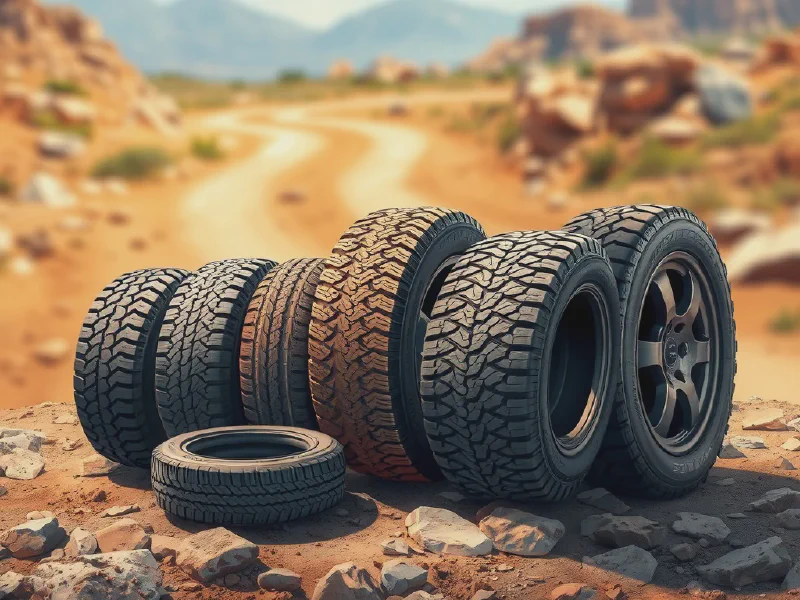Comprehensive All-Terrain Tire Guide: Choosing Your Perfect Tires

All-Terrain Tire Guide
Welcome to the comprehensive All-Terrain Tire Guide. In this article, we will explore all aspects of all-terrain tires, including their purpose, selection criteria, maintenance tips, performance characteristics, and cost considerations. All-terrain tires are essential for those who seek versatility in driving across different terrains, from smooth highways to rugged off-road conditions.
Understanding how to effectively use all-terrain tires can greatly enhance your driving experience. This All-Terrain Tire Guide aims to equip you with the knowledge needed to make informed decisions, whether you are upgrading your vehicle or simply exploring the outdoors. With the right tires, your vehicle can perform optimally in various conditions, ensuring safety and comfort.
Throughout this guide, we'll dive into topics covering what all-terrain tires are, how to pick the right ones based on your needs, and the best practices for maintaining them over time. This ensures that you maximize your investment while enjoying excellent performance no matter where your adventures take you.
Lastly, we will discuss all-terrain tire performance characteristics, cost considerations, and what you should know about warranties. By the end of this All-Terrain Tire Guide, you will be well-prepared to navigate the tire market and choose the best options for your driving lifestyle.
So, whether you're an off-road enthusiast, a daily commuter, or someone who occasionally ventures into the wild, this All-Terrain Tire Guide will provide vital insights to help you make the best choice for your vehicle and driving habits.
Understanding All-Terrain Tires
All-terrain tires are specially designed to provide a balance between on-road comfort and off-road capability. They feature tread patterns that allow them to perform well on a variety of surfaces including mud, gravel, sand, and asphalt. These tires typically have a rugged design that ensures durability and traction.
The benefits of all-terrain tires are numerous. They offer versatility for drivers who switch between different types of terrains and conditions. These tires provide good handling and stability on highways while also delivering enough grip on unpaved roads. Additionally, all-terrain tires often have a longer tread life compared to standard tires, making them a practical choice for those who drive frequently in varying conditions.
Common features of all-terrain tires include reinforced sidewalls for enhanced durability, unique tread patterns designed for maximum traction, and features that mitigate road noise. Many all-terrain tires also come with a higher tread depth, which allows for better performance on off-road surfaces as well as enhanced water evacuation to prevent hydroplaning.
Choosing the Right All-Terrain Tires
When selecting all-terrain tires, several factors should be considered. Firstly, think about your driving habits and the types of terrain you will frequently encounter. Additionally, consider the load capacity required for your vehicle and whether you prefer additional features like mud-specific tread designs or quiet highway performance.
There are several top brands that are well-regarded in the all-terrain tire market. Brands like Michelin, Goodyear, BFGoodrich, and Cooper are known for their high-quality options that cater to all-terrain needs. Researching reviews and comparisons can help you select the best brand for your specific requirements.
It's also vital to match tires with your vehicle type. Factors such as tire size, load index, and speed rating should be considered based on your vehicle’s specifications. Consulting with specialists at tire shops can ensure that you select the correct tires to enhance your vehicle's performance.
Maintenance of All-Terrain Tires
Proper maintenance of all-terrain tires is essential to ensure their longevity and optimal performance. Regularly checking tire pressure, rotating your tires, and ensuring proper alignment can prevent uneven wear and enhance performance. Additionally, cleaning the treads of mud and other debris helps maintain traction.
Watch out for signs of tire wear, such as uneven tread wear, cracking, or bulging sidewalls. These can indicate that your tires are not functioning optimally and may need attention. Regularly inspecting your tires ensures you can catch any issues early and address them promptly.
Knowing when to replace your all-terrain tires is crucial. If the tread depth falls below 2/32 of an inch or if you notice significant wear or damage, it's time to consider replacement. Make it a habit to monitor the condition of your tires regularly for safety and performance.
All-Terrain Tire Performance
All-terrain tires are built to perform on different terrains, ranging from rocky trails to smooth roads. They typically excel in varied conditions by providing a combination of traction and stability. On smoother surfaces, all-terrain tires can deliver a comfortable ride, while off-road, they grip well in mud, sand, and gravel, offering control and reliability.
When comparing all-terrain tires to dedicated off-road tires, it’s critical to note that all-terrain tires offer a compromise between on-road comfort and off-road performance. Dedicated off-road tires might provide superior off-road capabilities, but all-terrain tires are more versatile for daily use and varied driving conditions.
Tire pressure also plays an essential role in performance. Maintaining the correct tire pressure enhances traction and handling while improving fuel efficiency. Conversely, over-inflated or under-inflated tires can negatively affect performance, increase tire wear, and compromise safety.
Cost of All-Terrain Tires
The price range for all-terrain tires can vary widely based on brand, size, and specific features. Generally, you can expect to pay anywhere from $100 to $300 per tire. Premium brands and models with advanced technology will fall on the higher end of that spectrum, while budget options will be more economical.
Understanding tire warranties is also vital when considering cost. Many all-terrain tires come with warranties that cover defects in materials and workmanship. This can provide peace of mind and assurance of quality. Always read the warranty specifics to understand coverage details and any requirements needed to maintain that coverage.
Several factors affect the overall cost of all-terrain tires, such as the materials used, manufacturing processes, and included features like tread design and noise reduction. Higher-quality tires may have a higher upfront cost but can lead to savings over time due to durability and reduced wear and tear.